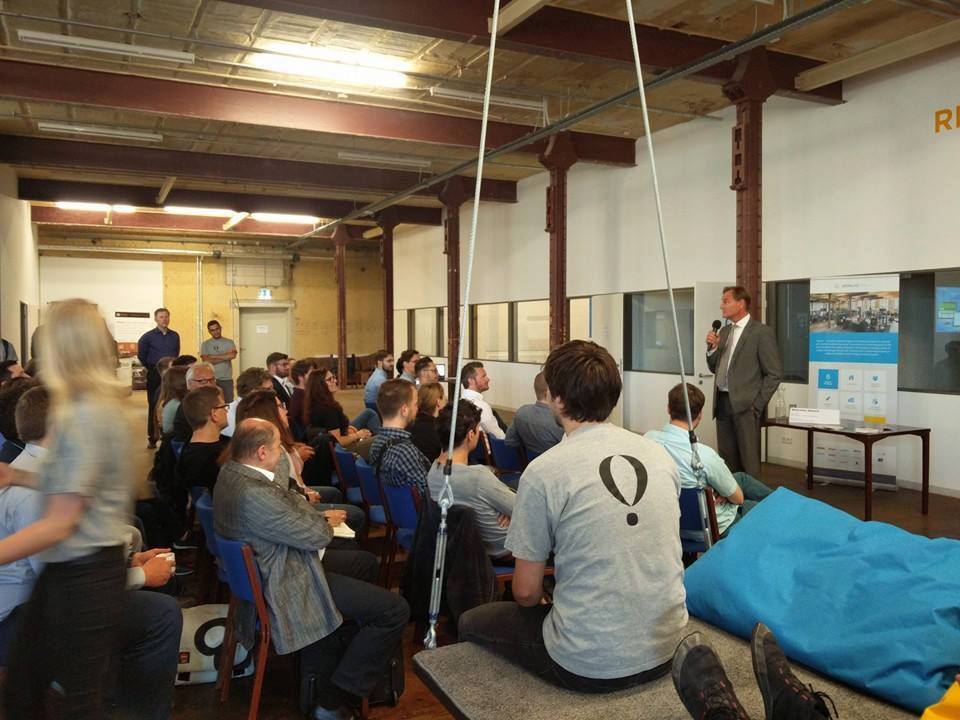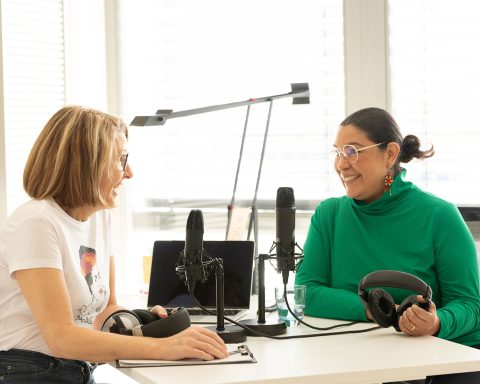Disco lights tinge the spacious halls of SpinLab different colors. A large swing (a fixture of the office) zips back and forth to the electronic beats, carrying some of Leipzig’s brightest young entrepreneurial minds, while others dance or crowd around the open bar. Here DIPAT, a medical-related startup and SpinLab alumnus, is celebrating its third anniversary. It’s also the closing party of the annual trek Basislager organizes through the Leipzig “startup ecosystem,” the “Startup Safari.”

Justus Wildt, a young physician, glides around the party, joyfully greeting guests. He smiles kindly and says hi to me too.
Justus has dedicated many hours to DIPAT as a volunteer. Not only has he helped to develop the product, but also to explain it to media that have picked up on the startup’s activities. (Even on TV.)
Paul Brandenburg, founder and head of DIPAT, recommended we talk to him.
We chatted with Justus sometime before the 18 May anniversary shindig; when the SpinLab space, where the startup remains in the alumni aisle, had its regular daytime (sober) face on. He told me in a follow-up email: “It is a really good feeling to invest time into a project you just can believe in and you don’t depend on [to make a living].”
Amid all this energy and life surrounding the startup, it might be hard to guess what DIPAT actually does. Or that these three years haven’t been such an easy journey getting people to sign up, or to become profitable. And this, despite what it offers literally being a matter of life or death – or maybe because of it.

Justus says most of the customers are elderly people, and many don’t go through with the required questionnaire. They could be new to the Internet and also to facing up to the reality that death is inching ever closer; that they need to express how they’d like it handled, before it’s too late.
German law makes it very difficult for the machines to be turned off, or for a patient not to be revived, without the patient’s own clear, written consent.
As Justus explains, DIPAT is an online service that asks them – in an intelligible manner for the average person – what they would want, and for how long and under what circumstances to be kept alive. The platform charges an annual fee to store the information, which the customer can keep reviewing and updating.
DIPAT then translates their decisions into the medical and legal jargon. According to Justus, run-of-the-mill patient decrees in Germany (Patientenverfügungen) are often confusing for the patient. Also, the document will likely fade and get crumpled, if carried around at all. Through DIPAT, a sticker on the patient’s health insurance card gives the coordinates for medical staff to access the patient decree online – and to honor the person’s wishes.
In other words, the many questions the DIPAT platform asks (in German) relate to gathering unequivocal details on what medical staff should do if the patient is no longer capable of deciding. Say, if the person loses consciousness due to illness or an accident. This can, of course, happen at any age, though we tend to avoid the topic.

Justus tells me he has been frustrated with the situation of terminal or vegetative patients in the German healthcare system. So much so that he has decided to switch into pediatrics: In the offline realm, he’d rather work with the beginning rather than with the end of life from now on.
Justus himself has filled out his patient decree with DIPAT, knowing the medical system first-hand.
“My experience from working as a doctor is that the majority of the patients are getting too much treatment in the hospital,” he says. “A good patient decree is a win-win-win situation. The patient doesn’t get more treatment than he [or she] wants. The doctor has security about his or her situation, and the insurance isn’t paying for over-care.”
DIPAT’s road to success is fraught with the tough, heartbreaking stories and realities that justify the startup’s existence in the first place. Central to all this is the taboo surrounding death in our society – and even more so, the one surrounding people’s choices in the matter.











